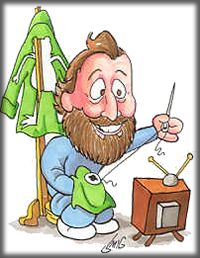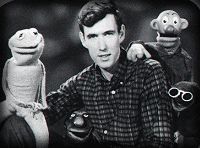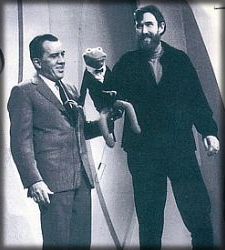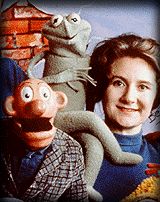| A
R T I C L E S |
New Collectibles •05/25 - NECA Sesame Street: Count Von Count Ultimate Action Figure
•04/25 - Reaction Sesame Street: Big Bird and Snuffy •03/25 - NECA Sesame Street: Ernie Ultimate Action Figure, Bert Ultimate Action Figure
•03/25 - Boss Studios Fraggle Rock: Boober Action Figure, Wembley Action Figure, Mokey Action Figure, Sprocket Action Figure •08/24 - Reaction Sesame Street: Big Bird, Mr. Hooper, Sherlock Hemlock, Super Grover |
||
|
|
|

I just want to say up front, I really appreciate you taking the time for this interview. I know you must be terribly busy with the last minute production aspects of The Dark Crystal and you also must be sick to death of interviews and stuff like that, and I'll try not to ask a lot of the kind of questions that people normally ask.
Nancy Evans of your own Henson Associates has been very, very helpful. She let me see some tapes of Time Piece, The Cube, and Of Muppets and Men - The Making of The Muppet Show. She let me look around the workshop.
HENSON: Holy cow! Did you look at those? Did you look at The Cube?
 Yes.
You know, the funny thing is I remember when it first aired. I remember
seeing it because I'm a big fan of Richard Schall. I'm very into improv
actors and I remember seeing it, but I couldn't remember all the details.
I enjoyed watching it again so much and I thought it was so well edited.
Yes.
You know, the funny thing is I remember when it first aired. I remember
seeing it because I'm a big fan of Richard Schall. I'm very into improv
actors and I remember seeing it, but I couldn't remember all the details.
I enjoyed watching it again so much and I thought it was so well edited.
HENSON: It's funny because I just looked at it myself about two weeks ago in Toronto. My 17 year-old son was up there with me at the time and I showed it to him and my 11 year-old daughter. Neither of them had seen it or remembered it. It's fascinating. I hadn't looked at it in 5 or 6 years.
And it hasn't dated at all.
HENSON: It was fun. I enjoyed it, and they - my son, in particular - said "Wow! It's really a great show."
Were you responsible for casting Richard Schall, because he was just perfect in it.
HENSON: Yeah, yeah. That was really a project that was a lot of fun and quite delightful, and that was back in the days when I was doing two careers, before I decided to concentrate on the Muppets.
I was doing some research on the influences on you - the early exposure that you had to other puppeteers - Burr Tillstrom and Bil and Cora Baird - and one of the shows that you probably saw was Life with Snarky Parker. Does that ring a bell, an early Bil and Cora Baird TV show in 1950?
HENSON: Only vaguely, I don't think I ever saw that show.
Oh. The reason that I ask is that, apparently, the show was set in the old west and there was a character called Ronald Rodent. I read somewhere else that the very first puppets you made were of a French-looking rat named Pierre and a couple of cowboys. I just wondered if Snarky Parker had rubbed off on you and that's where you got your initial inspiration for your first puppets?
HENSON: I don't think so, no, because what I really knew of Bil and Cora Baird's work was their variety show stuff. Immediately before I first did any puppets, they were doing a CBS morning show, in opposition to The Today Show. They were just doing novelty records and little tiny short bits and pieces.
In other words, they were lip-syncing the way you...
HENSON: I think so, yeah, and so I guess that was kind of how I started off into doing the record lip sync stuff.

|
|
A young Jim Henson with some of his earliest characters: Kermit, Sam, Yorick, and Harry. Sam and Friends ran for eight years on WRC television in Washington D. C. beginning in 1954. |
Speaking of that, when did the Muppets first talk? When did they stop doing the lip-syncing and start developing their own voices?
HENSON: Well, it was in those first couple of years. One of the first things I did was start a commercial series for Wilkins Coffee, and for that I did both character voices (Wilkins and Wontkins). That was almost the first voice stuff I did. I had been doing a couple of little tiny things on the show until then.
I read that these commercials were syndicated. I don't really understand that. How could you syndicate a commercial? Did you just change the voice track and substitute a different product name?
HENSON: Well, usually we reshot the entire commercial. You see, we started that commercial for a local coffee in Washington/Baltimore called Wilkins Coffee, and so those commercials would only go on the air in that area, but the commercials were an immediate hit and they made a big impact. In terms of popularity of commercials in the Washington area, we were the number one, most popular commercial. They got a lot of talk, and so then the advertising agency started syndicating them and they would sell them to a coffee company in Boston, another coffee company in New York.
But you would completely redo them for each coffee company...
HENSON: Yeah, right, and so for a while there - I bought my contract from that agency and then I was producing them - the same things around the country. And so we had up to about a dozen or so clients going at the same time. At the point, I was making a lot of money.
You're not in the commercial business anymore, are you?
HENSON: Not really. The last thing we did the beginning of last year was we signed with Polaroid, and we did a few for them, which have now ended, but that was my first dip back into commercials in years. When Sesame Street came on - well, it was a combination - we were too busy to do commercials and it was a pleasure to get out of that world. If you've ever worked in commercials, it's a world of compromise and a world of...
You're right. I used to think it would be fun to be behind the scenes and produce something like that, and I did work in an ad agency for a year, and I hated every minute of it. You're right about compromise. I was constantly told to talk down to people and pick the lowest common denominator, and it really made me grit my teeth. I was very unhappy.
HENSON: Yeah, it's interesting when you're working at the lower levels through agencies and that sort of thing, it's really quite difficult. At the time of Polaroid - and I did a couple of other commercials just before I stopped doing that stuff - at that point I was at the level where they respect you and your opinion and all that sort of thing. But even then it's still a matter of every meeting is a meeting with a dozen people who all have opinions and the whole process is really not easy on a creative person. So, anyhow.
You drew cartoons for your school paper and magazines. Were these little characters, like the early sketches you would do to create a Muppet, or were these actual cartoons with balloons and captions?
HENSON: Well, let's see. I did some of each. That very first Pierre, the French rat, that came out of a cartoon thing I had done for my high school magazine.
Are any of these still available or are these all collector's items?
HENSON: Oh, he's prob-- I'm sure we have him somewhere. We have an exhibit that's traveling around.
Yes, I saw it when it was at Lincoln Center; it's wonderful.
HENSON: If you saw it at Lincoln Center, you saw it at the very beginning.
That's right; it was the first stop.
HENSON: Yeah, and then thereafter we decided to mount it for traveling. We got invitations from a couple of museums and so it's been traveling for two years. It's in Detroit right now.
Is there going to be a permanent home for this when it finally stops touring, because it would be a shame not to allow people to have access to it - it's so wonderful.
HENSON: I don't - yeah, I would doubt it. We'll see. It's interesting, because that exhibit does a particular part of our career, but The Dark Crystal coming along does an entirely different thing, and we're starting a new show that's going on next year.
Fraggle Rock, yeah. Fraggle Rock, yeah.
HENSON: And that's another entirely different area, so I have a feeling that an exhibit type of thing will make sense for the next few years in different places; and we're thinking about sending that overseas to Europe. Yeah, and that would be nice.
Simultaneously with Sam and Friends (around 1955), which was on late at night, you were doing an afternoon show in DC. What was that called?
HENSON: Well, we did - actually we did a number of things. There was a little afternoon show that was called Afternoon. Back in those days in television, most local stations had a midday show for housewives that had a series of things. It was like a variety show for midday. So we did a few little entertainment pieces on that show.
So that was another 5 minutes that you had to come up with?
HENSON: Yeah, well basically, the work I did in those days is not stuff that I'm creatively very proud of.
I remember hearing on the tape you made with Fred Clarke that you refused to let the kinescopes out.
HENSON: Oh, yeah, that stuff was really experimenting and it was just stuff that I did as a lark. I was going to college and so I was doing this and it was a way of working my way through school.
How long did this afternoon show run?
HENSON: I'm not sure. It was on and off for a couple of years but during that time - you're saying an afternoon show - there were times that I had 3 shows a day. One was in the afternoon, one in the early evening during the 6 o'clock news strip, and then one during the 11 o'clock news strip. So it kept me busy.

|
|
Beginning in the mid-sixties, Jim Henson made numerous appearances on the Ed Sullivan Show. |
And yet, you left in the middle of all this and you went to Europe for a year. Did you leave your poor wife to do all of these shows at once all by herself?
HENSON: Well, it was before we got married and before we were at all romantically connected actually, because I was engaged to another girl and she was engaged to another guy. I decided that what I really wanted to do was go off and paint. I was an artist, you see, so I was going to take the shows off the air - just quit for a while. The station prevailed upon me. They said, "Look, we'll pay you money and you can put somebody else doing the show," and so I realized I can get money and at the same time be off painting. So I brought in a friend of mine, an art student from the University of Maryland, and he worked with Jane. His name is Bob Payne, and he's working back with me now - joined me again about 5 or 6 years ago.
I noticed as I looked at these older pieces of yours: Time Piece and The Cube, that the same names appear over the years. People are really loyal to you. They must really enjoy working with you and the projects and working conditions because the same names keep appearing all through the years.
HENSON: Yeah, well there are a lot of us that have been together for a long time. There's a small core that has been around a long time. Frank and I have been together for nearly 20 years now.
Luckily Nancy Evans was sitting with me when we were watching Time Piece, and she pointed him out to me as he dashed through it, or I would never have recognized him.
HENSON: Oh, he was - I think he was about 17 or 18 at the time. He was just a kid. That was right after he joined us.
He even had a longer name!
HENSON: That was Oznowitz, yeah.
Yeah, his original name was in the credits.
HENSON: Right, right. Jerry Juhl was in that also, did you know that?
Right, and Don Sahlin did the special effects.
HENSON: Yeah, and there's a flash shot of Don in there too.
I read that you were getting only $5 a show for Sam and Friends. Is that anything like reality?
HENSON: Yeah, well when I first started working, it was $5 a show; it was probably a little higher by the time I got to my own show, but I remember that they put me under contract at $100 a week, which to me was really an astronomical price.
But didn't you have to create all the sets and the puppets and your props out of that money?
HENSON: Yea, sure.
If only Lord Grade knew that!
HENSON: Yeah, well, I was a kid and it was fun. And also there wasn't much money in television in those days anyhow.
And it was only a local show.
HENSON: Sure.
Was the term "Muppets" coined specifically for Sam and Friends?
HENSON: Yeah, I think we did the term Muppets before we got the show Sam and Friends - a few months after I started working. It was really just a term we made up. For a long time I would tell people it was a combination of marionettes and puppets but, basically, it was really just a word that we coined. We have done very few things connected with marionettes.
When I talk with people at Henson Associates now, they practically blanch if you use the term Muppets in connect with The Dark Crystal. What is the difference between what you consider Muppets and what The Dark Crystal is, and have you coined a term for what the creatures in The Dark Crystal are?
HENSON: No, we haven't, and a number of people say "you really should have a term for that" but at the moment we're saying creatures.
Well, what is it that they're not Muppets?
HENSON: Well, to me the Muppets are sort of fuzzy, bright colored, cute, lovable caricatures that we know from The Muppet Show. Fraggle Rock also drops under the term Muppets. But I think in The Dark Crystal - you've seen some of the promotion tape on The Dark Crystal, for instance?
Well, I saw a trailer that had been theatrically released a couple of months ago, which is a real brief piece and I attend conventions here and so I've seen slides, but...
HENSON: Yeah, we have an 8-minute tape. If you want to see it, I'm sure that Nancy could make that available to you.
OK, thanks.
HENSON: But, it's just a little promotion tape that we made a couple of months ago, which has brief interviews with Gary (Kurtz) and Frank and myself and Brian (Froud), and a few little scenes of the film, but it gives you a more complete picture of it than the trailer certainly, but originally...
Is it - I remember in the interview that you did with Fred Clarke over Labor Day, he sort of labored the point that The Dark Crystal wasn't heavily into humor. Is that why you don't want it to be called a Muppet movie - because it's more dramatic and adventure-oriented than...
HENSON: Well, no, it's no so much the humor, but I have a feeling that the characters are just not Muppets at all. We hesitate to call them puppets even. I think of puppetry as being something more -- see, I love puppetry and what puppetry is, which is related to - if you - it sounds as if you've read everything I ever said.
Well, I may have! I've really delved into this.
HENSON: Yeah, so you know that my feeling about puppetry relates to stylization, simplicity, boiling down to - it's a wonderful form and I really love it. But with The Dark Crystal, instead of puppetry we're trying to go toward a sense of realism - toward a reality of creatures that are actually alive and we're mixing up puppetry and all kinds of other techniques. It's into the same bag as E.T. and Yoda, wherein you're trying to create something that people will actually believe, but it's not so much a symbol of the thing, but you're trying to do the thing itself.
Yeah, I understand that. We won't belabor that any further. The first Kermit was made out of your mother's coat. Would you say that it was just an accident that the coat was green and that maybe if the coat had been purple that Kermit would not have evolved into a frog?
HENSON: That's quite likely actually. Yeah, the first Kermit was not even a clean green- it's sort of more a turquoise - sort of a milky turquoise.
Yeah, I saw him at the exhibit. He looked a little faded.
HENSON: Yeah, well, no, he's not faded; that was the color he was.
That was his real color?
HENSON: Sure, but you see back in those days you may have read somewhere, but I didn't call him a frog.
Right, he was just Kermit the thing.
HENSON: Yeah, all the characters in those days were abstract because that was part of the principle that I was working under, that you wanted abstract things.
He didn't turn into a frog until you did The Frog Prince for a TV special.
HENSON: Yeah, that's right.
That was the first time he got flippers and his little pointed collar?
HENSON: Right.
He just seems so froggy to me.

|
|
The original Kermit in 1955, with Jane Nebel and sidekick Sam. In the early days, Jim was always fascinated with abstract characters as can be seen by the collar less Kermit. |
HENSON: Yeah, well it's interesting how that evolved. See I still like very much the abstract characters and some of those abstract characters I still feel are slightly more pure. If you take a character and you call him a frog, or like Rowlf, our dog, call him a dog, you immediately give the audience a handle. You're assisting the audience to understand; you're giving them a bridge or an access. And if you don't give them that, if you keep it more abstract, it's almost more pure. It's a cooler thing. It's a difference of sort of warmth and cool.
That's interesting because one of my questions farther down on my list here is, I know that Kermit is your favorite character, but I was going to ask whether you preferred abstract or representational puppets, and I think you've just answered that.
HENSON: Well, it's just that the two do different things. There are nice things about each and, in terms of going commercial and going broad audience, you want to reach the audience as much as possible, and you need those bridges. You need the characters that are more accessible, and that's why a Kermit or a Rowlf is more accessible as a style basically.
It's also interesting that you should mention that because just earlier today I was interviewing Lorne Michaels for this career article about you. He felt that this was the problem that the writers had on Saturday Night Live - that you had created these brand new characters and there were no rules about this land of Gorch. There were no parameters set up for what these characters could do and what would be expected of them, and the writers just couldn't seem to cope with that.
HENSON: Yeah, that's interesting. I'd be really interested to see what Lorne said, because I really respect Lorne. We talked a number of months before the show ever went on the air. He described the show and I really loved it. I saw what he was going for and I really liked it and wanted to be a part of it, but somehow what we were trying to do and what his writers could write for it never jelled. I felt it jelled later on when they did The Coneheads, because with The Coneheads, they found it was a slightly abstract thing but they were able to write it in a way and pull it into their style of humor. When they were writing for us, I had the feeling they were writing normal sitcom stuff, which is really boring and bland.
Well, maybe they thought it was funny to do sitcom stuff for characters that were so outlandish and weird.
HENSON: Yeah, but that wasn't enough though.
Anyway, he says primarily the same thing you did, that he felt that the writing just never came up to the standards of Muppetry and that part of the reason was the show itself was so new at that time and everybody was just feeling their way.
HENSON: Yeah, I think that's true. Yeah, it just never jelled with the particular writers we were working with, but at no time did I ever lose my respect for the show. I always liked what they were doing.
Yeah, well, he speaks very highly of you, too.
HENSON: Yeah, yeah, well I think we parted on very good terms and we really stopped doing the show because we had to go to England to do The Muppet Show.
|
|
|
home | news | collectibles | articles | forum | guides | radio | cards | help
Fan site Muppet Central created by Phillip Chapman. Updates by Muppet
Central Staff. All Muppets, Bear
Muppet Central exists to unite fans of the Muppets around the world. |